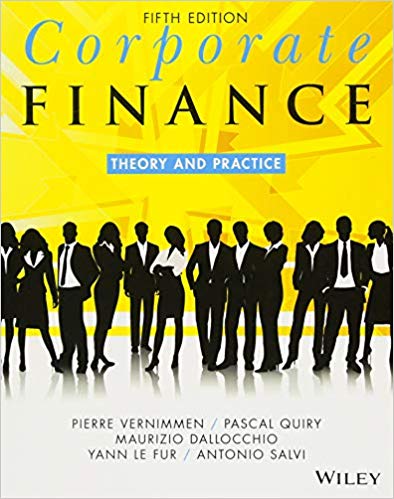Corporate Finance: Theory and Practice

Corporate Finance has long been a favourite among both students and professionals in the field for its unique blend of theory and practice with a truly global perspective. The fact that the authors are well-known academics and professionals in the world of mergers and acquisitions (M&A) and investment explains this popularity. This new Fifth Edition continues the tradition, offering a comprehensive tour of the field through scenario-based instruction that places concept and application in parallel. A new chapter has been added, devoted to the financial management of operating buildings that aims to answer questions such as, “to own or to rent?” “variable or fixed rents?” etc. The book’s companion website features regularly updated statistics, graphs and charts, along with study aids including quizzes, case studies, articles, lecture notes and computer models, reflecting the author team’s deep commitment to facilitating well-rounded knowledge of corporate finance topics. In addition, a monthly free newsletter keeps the readers updated on the latest developments in corporate finance as well as the book’s Facebook page, which publishes a post daily.
Financial concepts can be quite complex, but a familiar setting eases understanding while immediate application promotes retention over simple memorisation. As comprehensive, relevant skills are the goal, this book blends academic and industry perspective with the latest regulatory and practical developments to provide a complete corporate finance education with real-world applicability.
- Blend theory and practice to gain a more relevant understanding of corporate finance concepts
- Explore the field from a truly European perspective for a more global knowledge base
- Learn essential concepts, tools and techniques by delving into real-world applications
- Access up-to-date data, plus quizzes, case studies, lecture notes and more.
A good financial manager must be able to analyse a company’s economic, financial and strategic situation, and then value it, all while mastering the conceptual underpinnings of all decisions involved. By emphasising the ways in which concepts impact and relate to real-world situations, Corporate Finance provides exceptional preparation for working productively and effectively in the field.
Contents
-
-
- Chapter 1 - What is corporate finance?
-
- PART 1 - FINANCIAL ANALYSIS
- Title 1 - Fundamental concepts in financial analysis
- Chapter 2 - Cash Flows
- Chapter 3 - Earnings
- Chapter 4 - Capital employed and invested capital
- Chapter 5 - Walking through from earnings to cash flow
- Chapter 6 - Getting to grips with consolidated accounts
- Chapter 7 - Getting to grips with consolidated accounts
- Title 2 - Financial analysis and forecasting
- Chapter 8 - Les points complexes de l'analyse des comptes
- Chapter 9 - Margin analysis: Structure
- Chapter 10 - Margin analysis: risks
- Chapter 11 - Working capital and capital expenditures
- Chapter 12 - Financing
- Chapter 13 - Return on capital employed and return on equity
- Chapter 14 - Conclusion of financial analysis
- Title 1 - Fundamental concepts in financial analysis
- PART 2 - INVESTORS AND MARKETS
- Title 1 - Investment decision rules
- Chapter 15 - The financial markets
- Chapter 16 - The time value of money and net present value
- Chapter 17 - The internal rate of return
- Title 2 - The risk of securities and the required rate of return
- Chapter 18 - Risk and return
- Chapter 19 - The required rate of return
- Title 3 - Financial securities
- Chapter 20 - Bonds
- Chapter 21 - Other debt products
- Chapter 22 - Shares
- Chapter 23 - Options
- Chapter 24 - Hybrid securities
- Chapter 25 - Selling securities
- Title 1 - Investment decision rules
- PART 3 - VALUE
-
- Chapter 26 - Value and corporate finance
- Chapter 27 - Measuring value creation
- Chapter 28 - Investment criteria
- Chapter 29 - The cost of capital
- Chapter 30 - Risk and investment analysis
- Chapter 31 - Valuation techniques
-
- PART 4 - LA POLITIQUE FINANCIÈRE
- Title 1 - Capital structure policies
- Chapter 32 - Capital structure and the theory of perfect capital markets
- Chapter 33 - Capital structure, taxes and organisation theories
- Chapter 34 - Debt, equity and options theory
- Chapter 35 - Working out details: The design of the capital structure
- Title 2 - Equity capital
- Chapter 36 - Returning cash to shareholders
- Chapter 37 - Distribution in practice: dividends and share buy-backs
- Chapter 38 - Share issues
- Chapter 39 - Implementing a debt policy
- Title 1 - Capital structure policies
- PART 5 - FINANCIAL MANAGEMENT
- Title 1 - Corporate governance and financial engineering
- Chapter 40 - Setting up a company or financing start-ups
- Chapter 41 - Choice of corporate structure
- Chapter 42 - Initial public offerings (IPOs)
- Chapter 43 - Corporate governance
- Chapter 44 - Taking control of a company
- Chapter 45 - Mergers and Demergers
- Chapter 46 - Leveraged buyouts (LBOs)
- Chapter 47 - Bankruptcy and restructuring
- Title 2 - Managing working capital, cash flows, financial risks and real estate
- Chapter 48 - Managing working capital
- Chapter 49 - Managing cash flows
- Chapter 50 - Managing financial risks
- Chapter 51 - Managing operational real estate
- Epilogue - Finance and strategy
- Top 20 largest listed companies in 14 countries
- Contents
- Index
- Title 1 - Corporate governance and financial engineering







